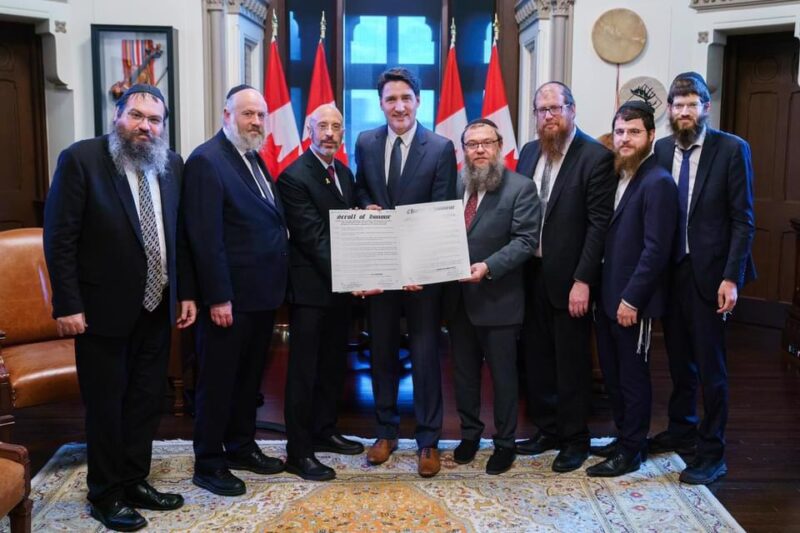
Trudeau and Poilievre Sign Joint Resolution Honoring the Rebbe
by Moshe New – chabad.org
Canadian Prime Minister Justin Trudeau and Leader of the Opposition Pierre Poilievre met with a delegation of Chabad-Lubavitch emissaries last month to honor the life and work of the Rebbe—Rabbi Menachem M. Schneerson, of righteous memory.
Meeting at Parliament Hill in Ottawa, the dignitaries affixed their signatures to a joint Parliamentary Proclamation or “Scroll of Honour” that was “in tribute to the vision and leadership of the Lubavitcher Rebbe,” and called for July 9—the 30th anniversary of the Rebbe’s passing—to be “a day of good deeds.”
Organized in collaboration with Rabbi Chaim and Bassy Mendelsohn, who co-direct Chabad of Centrepointe in Ottawa, Rabbi Menachem Mendel and Dina Blum, directors of the Ottawa Torah Centre and Rabbi Chaim and Yocheved Boyarsky, directors of the Rohr Chabad Student Network of Ottawa, the signing event was an opportunity for the politicians to honor the Rebbe’s impactful legacy on both Jewish and broader communities in Canada.
“The work and legacy of the Lubavitcher Rebbe—Rabbi Menachem M. Schneerson, of blessed memory—or to millions around the world, the Rebbe, is remembered by many,” the prime minister’s office reiterated to Chabad.org in a statement.
“He is recognized as one of the most influential Jewish leaders of modern times, and is recognized for his work both to Jewish scholarship and community outreach. It was in recognition of his work, the universal values he represents and his positive impact that the Prime Minister signed a proclamation to commemorate the 30th anniversary of his passing.”
The rabbis joined the leaders in an early ceremony, a month before Gimmel Tammuz because Parliament rises for the summer in the middle of June.
“Being that this summer will mark 30 years since Gimmel Tammuz, it is amazing that the Rebbe’s continued impact on not only broadly world Jewry but Canadian Jewry was honored by the leaders of the country,” Rabbi Mendelsohn told Chabad.org.

At the signing of the unprecedented joint proclamation, the leaders of the opposing parties remarked that the Rebbe was one of the few people who “transcends politics.” The proclamation echoes that sentiment.
It states: “The Lubavitcher Rebbe envisioned a world where darkness is fought by adding light, emphasizing the importance of good deeds, kindness, Torah study and prayer to uplift and protect.”
Trudeau is not the only Canadian prime minister to draw attention to the Rebbe’s work in strengthening Judaism globally. In 2009, Canadian Prime Minister Stephen Harper joined members of the House of Commons in saluting the Canadian Federation of Chabad-Lubavitch as 100 emissaries gathered for a national conference on Parliament Hill.
The meeting was a joint venture between Chabad of Centrepointe, the Ottawa Torah Centre and the Chabad Student Network, and the delegation was joined by Elisha Wiesel. Wiesel spoke to the assembled leaders about the connection between his late father—Holocaust survivor and Nobel Prize laureate Elie Wiesel—and the Rebbe and the determination they had to make the world a better place following the Holocaust.
Wiesel shared on social media that it was “so meaningful to see the Opposition Leader join the PM [sic] in marking the Rebbe’s 30th Yartzeit as a Day of Good Deeds in Canada. I shared my deep gratitude with Pierre Poilievre and co-deputy Melissa Lantsman for standing with the Jewish people no matter how loud the haters scream.”
In fact, Elisha told the two Canadian leaders that it was directly thanks to the Rebbe’s intercession that he was born in the first place.
In a letter written to Elie Wiesel in 1965, the Rebbe urged the broken Vizhnitzer chosid, who had lost so much in the Holocaust, to focus not on what was, but rather, to the future.
“You must make every effort to tear yourself away from your memories and adopt a lifestyle with a stable structure—married life—and establish a Jewish home and a Jewish family,” the Rebbe wrote. “This will certainly bring about Hitler’s true downfall—that he was not successful in his attempts at making it that there be one less Vizhnitzer Chassid in the world. On the contrary, you will raise children and grandchildren who are Vizhnitzer Chassidim until the end of time.”
Wiesel married Marion Erster Rose, originally from Austria, four years later in 1969; they had their only son, Shlomo Elisha, in 1972.
Elisha participated in a community event hosted by the three Chabad centers after the ceremony, where he addressed an audience of 300 about the significance of the Rebbe’s vision and the importance of unity following the attacks in Israel on Oct 7.











